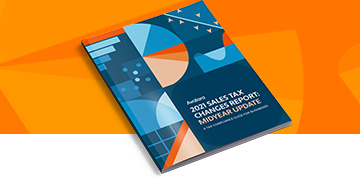Georgia taxes food delivery, lodging, and rideshare facilitators as of April 2020
Sales tax changes wait for no one. Thus, Georgia’s new marketplace facilitator law went into effect in the midst of the new coronavirus (COVID-19) pandemic. As of April 1, 2020, many food delivery platforms, lodging facilitators, and rideshare marketplaces must collect and remit sales tax on behalf of their third-party sellers.
The new sales tax obligation applies to marketplace facilitators with a physical presence in Georgia, and those with at least $100,000 in direct and indirect sales into the state. Georgia defines a “marketplace facilitator” as a person that contracts with a seller, in exchange for any type of consideration, to facilitate or make available a taxable retail sale. This is accomplished by directly or indirectly:
- Collecting, charging, processing, or otherwise facilitating payment of the retail sale on behalf of a marketplace seller; and
- Providing a service that makes available or facilitates the retail sale in any manner.
There are many ways to facilitate a sale through a marketplace, including but not limited to:
- Promoting, marketing, advertising, or taking orders or reservations
- Providing the physical or electronic infrastructure that brings purchasers and marketplace sellers together; or
- Transmitting or otherwise communicating the offer and acceptance.
Merely processing the payment for a retail sale does not constitute facilitating a sale. For more details, see Marketplaces to collect sales tax on third-party sales in Georgia.
In many states, there’s confusion around exactly what types of businesses qualify as a marketplace. For example, would food delivery service providers (e.g., DoorDash or Grubhub) qualify? Lodging facilitators (e.g., Expedia or Hotels.com)? Rideshare facilitators (e.g., Lyft or Uber)?
Georgia’s new law applies to all three, and that’s a big change. Prior to April 1, no one collected sales tax on those sales.
Food delivery networks and lodging facilitators
The Georgia Department of Revenue provides the following as examples of marketplace facilitators.
Food delivery facilitator. Company A advertises local restaurants on flyers and mailers or through its website or mobile app. Customers order restaurant food by telephoning Company A (or ordering online/via the app), which processes customer payments and delivers the food to the customers. Company A is a marketplace facilitator (provided it’s not a franchisor and none of the restaurants made annual gross sales in Georgia of $500 million or more).
Lodging facilitator. Company B facilitates sales of lodging and accommodations (e.g., hotel rooms and homes for rent) through its booking website. Customers visit the website to research, reserve, and pay for lodging and accommodations. Company B processes customer payments. If Company B has more than $100,000 in taxable retail sales in the state in the previous calendar year, it’s a marketplace facilitator.
Rideshare facilitators
According to the fiscal note of the bill (HB 276), state and local sales tax applies to gross payments for rideshare services starting April 1, 2020. It estimates state and local sales tax revenue from ridesharing services would be $13.5 million in fiscal year 2020 — increasing to as much as $29.7 million in fiscal year 2024.
Rideshare companies are pushing back. Rather than charging sales tax on each ride, they want to see a flat per-ride fee on their services. Uber spokeswoman Evangeline George said, “While sales tax will begin applying to rides on April 1, we are advocating for a resolution.” Lawmakers are listening.
HB 105 would levy a 50-cents-per-ride fee on for-hire ground transport trips, and a 25-cents-per-ride fee for shared for-hire ground transport. Rideshare companies would be responsible for collecting and remitting the fee. If enacted as currently written, it would repeal “all laws and parts of laws in conflict” with it.
The Legislature is expected to resume discussing HB 105 when it returns to session. It’s currently suspended due to COVID-19.
More information regarding Georgia’s marketplace facilitator law can be found at the Georgia Department of Revenue. To learn more about marketplace facilitator laws in other states, see our state-by-state guide to marketplace facilitator laws.
New 2021 tax changes report: midyear hospitality update
Your guide to navigating the complicated world of tax compliance and preparing for the future

Stay up to date
Sign up for our free newsletter and stay up to date with the latest tax news.














